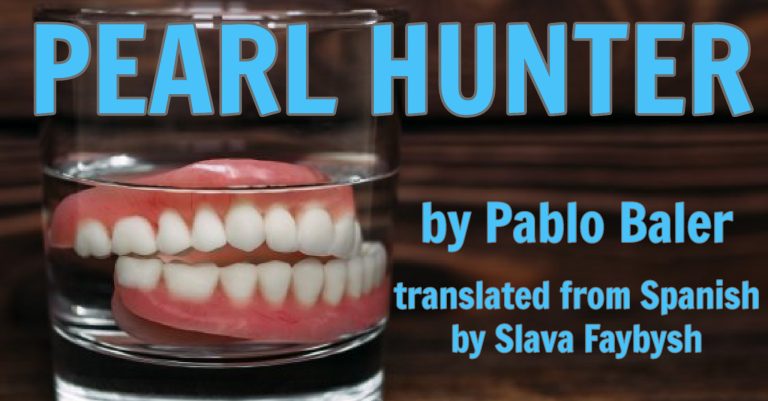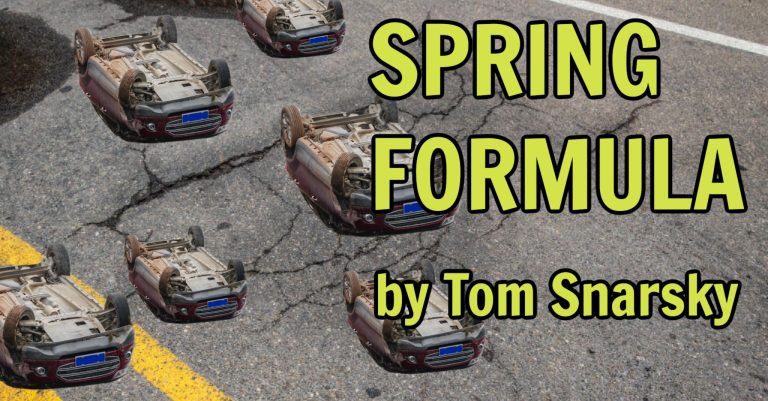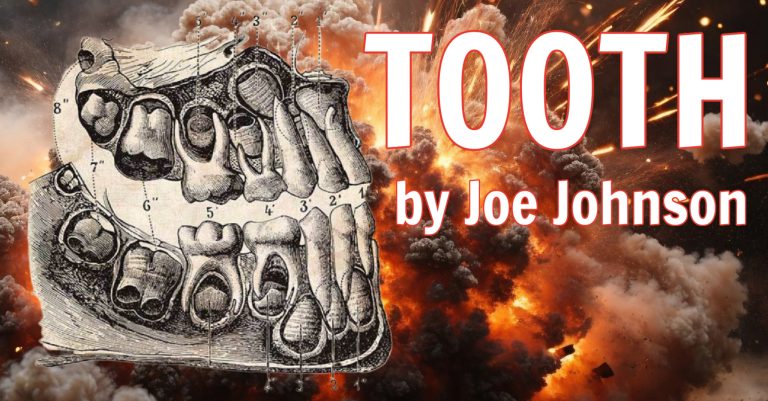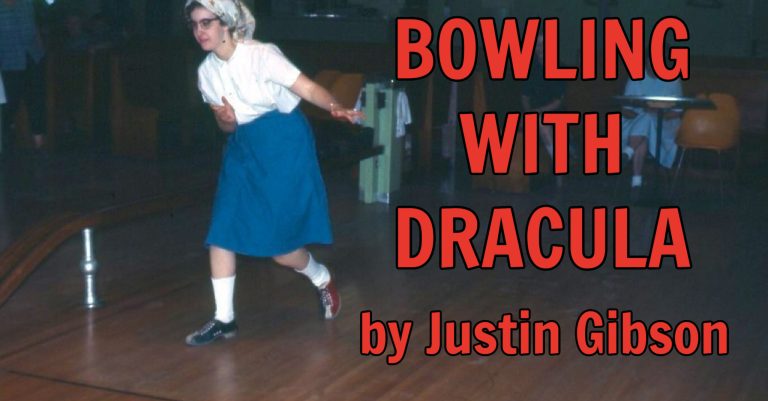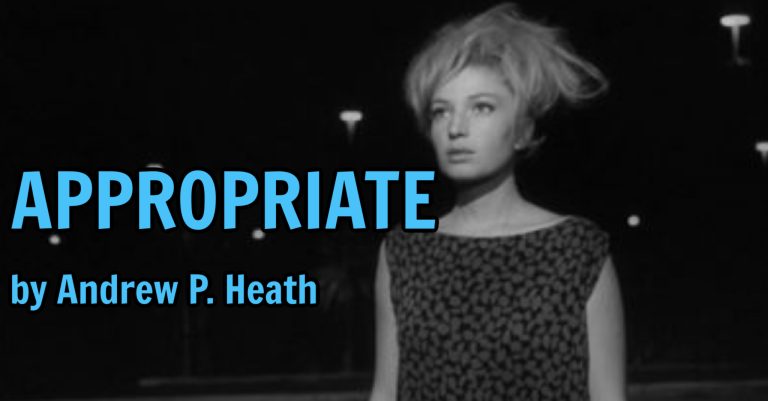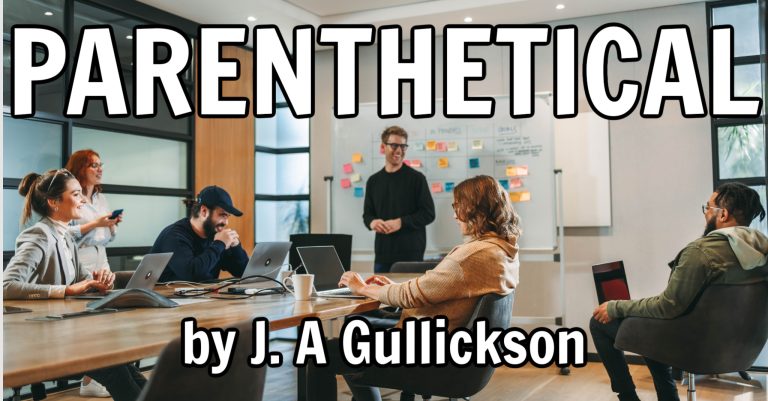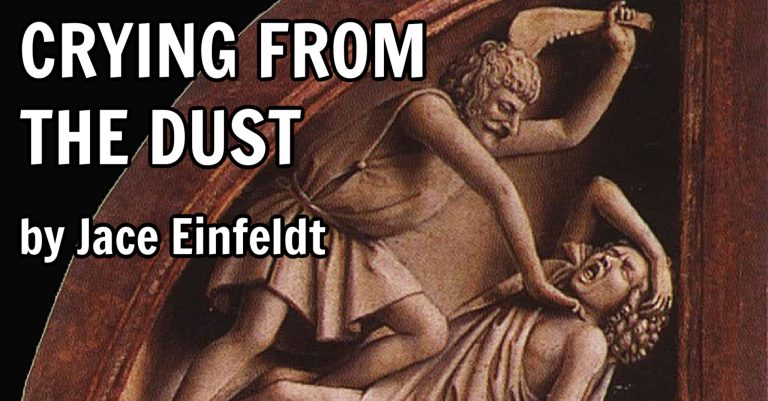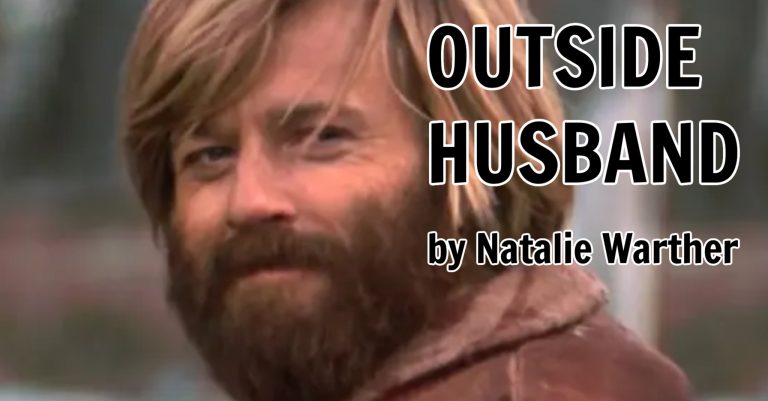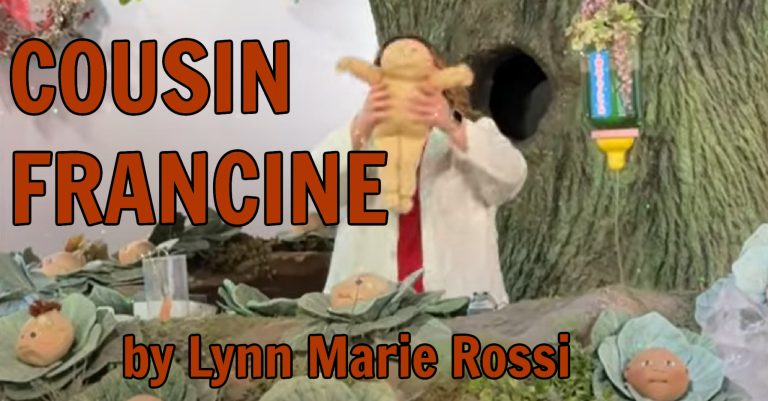April 30, 2025
The itch begins in the jawbone under the gums. I can’t get to it with a finger or tongue or backscratcher. Have to let it itch, like watching a fly you can’t swat tickle your forearm. It’s happened before. Happens more these days. Nothing shows up on x-rays, and now dental insurance is all used up.The tooth itches as the boss talks. He’s wearing a suit on casual Friday. It’s gray and fits him in the shoulders but not the belly, so he leaves it unbuttoned. The blue striped tie hangs over his belt. It’s like he’s guest-hosting a nineties talk show. The boss scans the room as he talks, and it’s like he’s looking right at you. He makes that passing sort of eye contact of CEOs and preachers. The way experts do during their TedTalk on the secret history of statistics. You know the talk: This message will change your life.The office is desks and phones, like in old movies. Phones on every desk, desks in every cubicle. Phones now ring in the background because the boss has gathered us to stand by a long table—a hundred of us, the whole floor, in a semi-circle. The table is in front of the west windows overlooking the city. On the table sits a vase. In the vase, an orchid. By the orchid is a box. The boss is in front of the table. He raises his arms in symmetry. He learned this somewhere, probably the same boss school that taught ambiguous eye contact and said to give bad news on Friday afternoon. The boss, we all know, is about to lay half of us off. Year-end is the time of “tough” choices. Boss school must have taught him, Make sure to look like this hurts you too; you did everything you could.Right then, the itch itches, just at the bottom of the molar. Those roots go down into the bone. The boss is saying something about Hannibal crossing the Himalayas on elephants. He’s going to quote the Dali Lama. Put money on it.Speaking of the Dali Lama, four summers ago, on my two-week vacation, I was in India on overcrowded sidewalks. A bike courier blazed by in his cotton shorts and glasses and no-helmet, just pumping. He turned past a truck, then around a car, then hopped onto the sidewalk. But a pigeon, swear to God—didn’t even know India had pigeons—plopped down in front of him. Pigeon, gray and blue and clueless, stalled right in the path between the bicyclist, a bus in the road, and a fire hydrant.Instincts took over: Bicyclist turned, missed the bus but rammed into the hydrant. The bicyclist was going as fast as the cars were supposed to be going, so when he fell off the bike, his body flew car-speed. The pigeon didn’t flinch. Just waddled along while the bike bounced into the road and went under the bus tires, as the bicyclist soared overhead, like, yes, a bird, but landed like an egg. Rammed his unhelmeted head into a bench. The crowd swarmed the bicyclist. He was laid flat out, maybe breathing. All I remember is a tooth on the sidewalk. A whole tooth, the big molar. It’s like a wicked iceberg—the top half is rounded and blunt, but beneath that flat top a root system runs sharp and long, like those Italian horn pendants disco dancers used to wear. The bicyclist’s molar was speared with two points. Those points, when not being knocked out, stick in the bone beneath the gums.That’s where the itch is: in the bone, at the tips of those points at the end of the molar. Not a strong itch, just an unreachable one. But it goes on long enough—boss talks about how proud he is of what we’ve all accomplished “together” (arms raised like an Olympian)—and the idea of finding pliers and pulling the thing out seems reasonable.“…over the Himalayas,” says the boss. Himalayas? Hannibal crossed the Alps.While the boss is riding mastodons up Everest, here in the room, across the circle of employees gathered near the west windows overlooking the city, standing beside the boss, one of the secretaries, Shannon or Shelly-something, sneezes. And that slows the boss. The boss says “Bless you” like a priest. The sneeze, though, sparks an idea: Fake a cough. In the cough, maybe with my mouth covered, I could stick my thumb inside and wiggle the tooth. A wiggle usually makes the itch stop. Except the boss is the center, like the sun, of a half circle, and we’re in orbit around him, but also directly across from our current (and future-former) coworkers. So maybe a push against the cheek. The right hand comes up slowly. Don’t draw attention. Move like the room has motion detectors. Then a test—just a quick scratch of the neck, like maybe the heater kicked on and the breeze set off the small hairs. Nothing to notice. Take your time. The boss isn’t going to stop until he’s scaled Mount Kanchenjunga.No one turns. They’re all still focused on the boss. No one watches the fingernails scratch the side of my throat—up, down, small circle. The scratch takes focus off the tooth, but not all. Like a mosquito has somehow gotten inside. That moment when the mosquito is in the vein, before it pulls out and the brain says, “Kill it.” But by the time you notice a mosquito, it’s already got your blood, and left its spit.Boss pauses. This is the emotional climax. He says something about Nepal, and you know that he practiced this in front of a mirror. He’s got a ring on his finger. He practiced this for his wife. I assume he’s straight. It’s something about the suit, the off-the-shelf that doesn’t fit. He said to his wife, “How does this sound?” and he raised his arms and rehearsed, “The real test of character comes not in victory but in loss.” She said, “It’s great.” She asked if they had anything going on Sunday because an old college friend was in town and wanted to go for lunch. The boss said, “Sounds fine.”Then my knuckle pushes against the cheek, and it does nothing. The cheek is condoms. There’s no way to get to the itch without going in. But the sneezing secretary is looking across now. She knows who the boss means when he says, “and even in hardship.” For the boss she typed up all the emails and attachments waiting in our inboxes, ran the names by HR. She’s probably screwing Boss. His “Bless you” was too concerned. Boss probably tested his speech on both wife and mistress. He’s that kind, like Hannibal: too much man for one woman. Leaves his seed in every town he conquers. Or maybe I’m thinking of Genghis Khan.So, the thing to do is bring the other arm across the chest, to support the arm raised to the cheek, to tilt the head in the look of serious concentration: the dreamy co-ed in that Indiana Jones movie. The secretary is scanning the circle now. She looks past me. Doesn’t make eye contact. Maybe that means I’m not getting laid off. Or that I am. Once the secretary’s gaze returns to the boss, I push in again. Hard. And the push helps. It’s a dull pain. Cheek smushed into all the teeth. And the pain feels good. Push harder. The itch is still there, but the cheek, the inside mashed against the jaw, helps. The cheek warms like a fever.The boss pauses. He drops his arms. Puts them into his pockets and billows the edges of his suit jacket up and out. He stares at the ground. This is the point when all of us, fired and unfired, are supposed to feel for him. His Sophie’s Choice. This is when he talks about the American spirit after 9/11.It’s a stupid job anyway. Lay me off. Let me go. Terrible dental.The boss has his hands in his pockets, like a sign to do the same—lower my arms. Uncross. Unclench. And as soon as the cheek pain settles away, the itch comes back stronger. The tingle, like centipede feet. Inside the jaw, at the pointy tips of the molars in the bone. You would kill to fly unhelmeted and head-first into a bus bench. You would kill for pliers.And you can’t believe it, but that’s what the boss has. He pulls them from his pants pocket. One of those Swiss Army knives. No, a Leatherman. They don’t let you take those things on planes anymore. Someone would hijack a Delta with a Leatherman: “Take me to Cuba. I have a bottle opener.” With his Leatherman in hand, the boss reaches back toward a box on the table by the orchid in a vase. The box is sealed, so the boss needs the Leatherman to clip the straps on the box. Everyone is looking at the box. They all want to know what’s in the box. But I’m following the Leatherman with the knife out, with the pliers tucked inside.The boss sets the Leatherman on the table. The secretary watches the boss lovingly, excited about the box.The boss smiles. From the box, straps clipped, he pulls out a trophy. A real trophy, like they used to give in bowling leagues in those days when men wore Italian horn pendants and took knives on planes. He’s talking about the trophy, about Bill in Engineering, and forty years of service.Bill walks through the middle of the half-circle to the boss. The boss is all smiles. Couldn’t be prouder if Bill were his own father. Forty years of devotion. And there’s no way to replace that much knowledge and skill. No way to replace Bill. The company won’t be the same without him. But the boss and his secretary will make do. They’ll probably both get bonuses for replacing Bill with two part-timers in India.So then I step behind the circle and walk the perimeter because everyone is watching Bill get his trophy, even the secretary. Secretary most of all. The secretary seems really glad Bill is leaving. She says, “What are you going to do with your free time?” Bill grips the trophy and shrugs. And I’m closer now, side-step by side-step.The Leatherman waits on the table by the vase. Almost there. Jenny in accounting turns back, but not before I’m past her. Eyes forward, Jenny.Bill says he’s looking forward to time with the grandkids. What else is he going to say? That he’s planning to leave his wife. That he has a one-way ticket to Las Vegas. Gonna blow twenty-grand on legal prostitutes who smile when he asks for a birthday special.Now I’m at the table, behind the secretary, and the secretary has a good rear for someone who sits as much as secretaries sit. It’s just an observation. I don’t mean anything by it, but it is a surprise. How she lives at a desk, but she’s tight as a gymnast. It’s impressive. Just that kind of discipline.The tooth pulses now. Dull throbs, like a strobe light. And maybe it’s the movement, shuffling my way behind the half-circle, the blood pulsing. It’s pushing now. The boss says, “Let’s give Bill a hand.” The applause is my shot. So I press past, behind the secretary’s behind, reach across the table. My forearm grazes the orchid vase. It wobbles. I pluck the Leatherman. Pull it back smooth and quick as the boss says, “Bill, we’re going to miss you.” Orchid vase teeters. Vase does a spin like a coin settling—heads, tails. Vase stops.Bill takes his final walk back across the circle. Don’t worry, Bill. You aren’t the only one going home today. At least you get a trophy.And I’m back out, careful to slide the tool into my pocket, holding it with my left hand so it doesn’t slip and cut through the fabric. Moving step by step around the outside, past Jenny in accounting. Jenny’s not looking, but she steps back and closes the gap between me and the wall, and it’s her or the wall, and I plow into Jenny. Watch where you’re going, Jenny.Jenny teeters. She stumbles into the accountants, but I press on—didn’t even nick my thigh with the knife. The boss says, “On a serious note.” He’s at the end, and I’m back where I started. The boss pauses because the accountants are mumbling, and Jenny is straightening her shirt. The boss backs it up and tries again. “On a serious note,” he says. He says he’s done everything he can. He says, “But it’s like the Dalia Lama said, ‘If a problem cannot be solved there is no use worrying about it.’”He has a point there. When the pink slip comes my way, I can’t control that. The secretary waves her arms to get our attention. Good arms. Secretary is thirty-five, maybe forty, and goes sleeveless. She invites everyone to join in the break room. There’s cake for Bill. Cake for the lot of us who have emails waiting in our inboxes: instructions for What’s Next on our own journeys across our personal Himalayas.Then the circle collapses, splits into a hundred points all shuffling back to cubicles or to the break room, some patting Bill on his shoulders, Bill with his trophy on his way to claim his cake. The itch might go away with cake, the chewing. At least then, if I stick a fork in my mouth, no one cares. And I could cut the cake with the Leatherman, with the knife edge pressed against my thigh. But the cubicle first. The email, the merciful email.Back at the desk, the itch slows. I’m in my own cubicle, surrounded by a portrait of the 2001 Seattle Mariners, Taylor Swift bobblehead from a niece. I set the Leatherman on the desk. Close the blade. It’s the pliers I want.The computer screen wakes. It knows I’m back and has messages for me. The computer talks with other computers and already knows what the other computers know. Computers are gossips. From the other cubicles come the first sighs and oh-shits and thank-gods. The murmur like a hive. No one uses the office phones on their desks. They pull out their personal cells to call home. “Honey, I got bad news.” Some whimpers. Some sniffles. And I don’t know if the cries come from the people laid off or those left behind.My computer is slow. I’ve been asking for a new one since Halloween. The inbox is buried under windows. And by the time I get to it, there’s nothing. During that whole boss-talk, I missed six emails about invoices, but nothing like “it saddens me” or “we thank you for your service.” And the tooth pulses again. The Leatherman goes back in my pocket, and I head to the breakroom because at least there’s cake and maybe that will help. Maybe there’s ice cream with the cake and that can numb everything. Sometimes when this happens, I get a glass of crushed ice from the breakroom fridge dispenser and pinch the ice between cheek and gum like chew. The dentist says that’s no good. He says, “Have you tried B-complex vitamins?” Yes, and peppermint tea bags and hydrogen peroxide and Anbesol.Bill is by the microwave and flanked by other engineers. Bill’s happy, which is odd because no one’s ever happy. Yes, sometimes people are pleasant or amused, but never happy. And how the hell did Bill make it forty years—and is that the secret: that if you can give the company four decades, you get to be happy. In thirty-four years, I’ll grin like a piñata.No ice cream. And the cake doesn’t help. It’s white and over-sugared with supermarket raspberry jam for filling. The chocolate frosting is dry as plaster, but the breakroom fills with chatter about how good the cake is. Jenny in accounting says, “The cake is great.” You know nothing about cake, Jenny.I’m standing by the cake and Bill comes over for a second slice. He doesn’t want a whole piece. “Just a sliver,” he says, and I’m standing at the table by the cake, and Bill’s looking for a knife.“I have a knife,” I say, and pull from my pocket. “Great Leatherman,” says Bill. But he doesn’t take it.So I ask him, “What’s the secret?” Bill grins but won’t tell. Then the itch comes back like an allergy. And I know how rude this looks, but, on Monday, Bill will be in Vegas pouring massage oil on hookers, so I just do it. I set the Leatherman down by the cake and reach my hand inside and wiggle the tooth. My hand comes out pulling a string of spit—like I’m a basset hound.“Itch?” says Bill. He smiles like one of those wise Cherokee in every western movie. “Yes,” he says, “there’s a secret.” Bill sets down his plate. He moves his hands to his mouth. He flinches, pinches around, and draws from between his lips. Out, in his glistening hand, comes his top dentures. Bill smiles like a railroad tramp, all gums. And his face falls saggy. But happy saggy. Then tilts his head, puts the plate back in, bites down, and restores his face.He says, “Pliers don’t work. I know a guy who can get you forceps. And lidocaine.” Then Bill says he’s changed his mind and takes the full slice. He grabs a piece with his hand and sets it on his plate, then licks the raspberry jam from his fingers. “Here,” I say, and lift the Leatherman to Bill once more. “Congratulations,” I say. But Bill says he already has all the Leathermans he needs and walks back to the guys from Engineering with his full slice of cake.The Leatherman is perfectly designed. A knife and a saw and pliers all in one working unit. The knife for cutting cake. The pliers for pulling teeth. And maybe Bill is wrong about pliers. Only one way to find out. And maybe the company that makes the Leatherman is hiring, needs a good accounts guy. Probably that company has amazing dental. I could leave, at least after the Christmas bonus—no sense going before then. And the tooth isn’t itching now. And if the itch comes back, I know how to handle it. If it gets too bad, I have the pliers to rip that thing out or can get lidocaine from Bill’s dealer. I’ll take action. It’s like the Dalai Lama says, “Happiness comes from your own actions.” Or maybe it was Hannibal or Genghis Kahn. Either way, isn’t being happy what it’s all about.
Read More » 